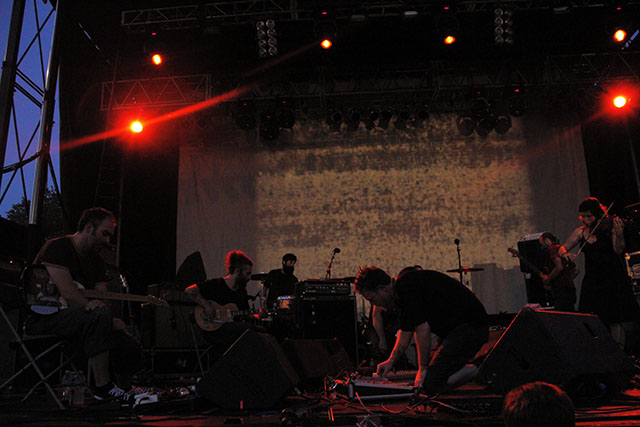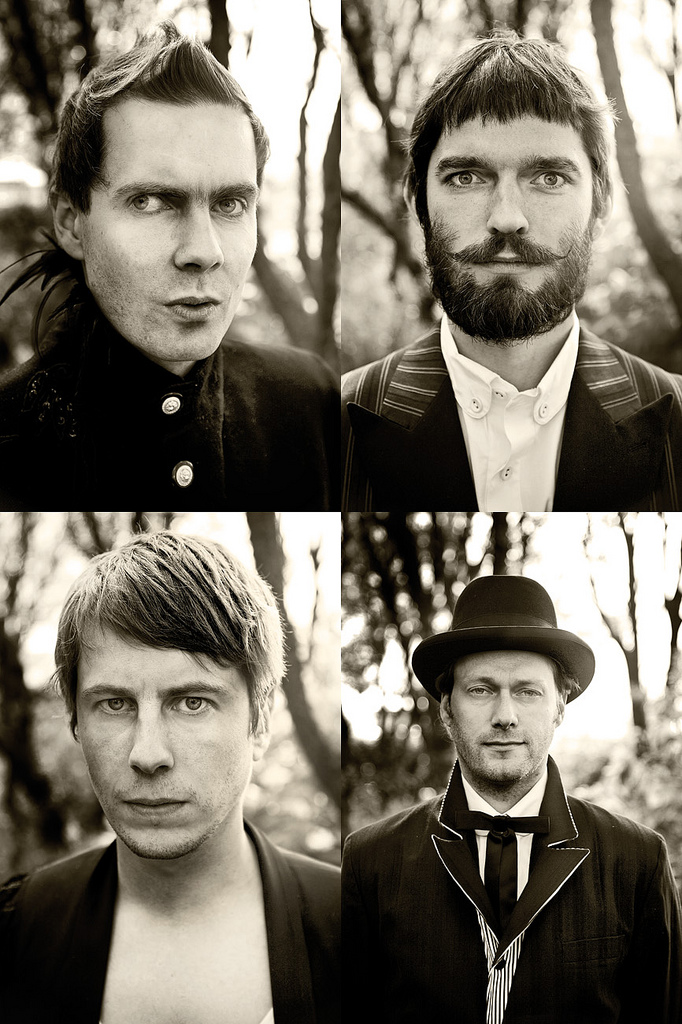
![]()
![]()
The small subgenre of music known to most as post-rock seems to have run its course. That’s not to suggest that the steadied and beautiful hands that craft such intricate melodies have stopped doing what they do best. No, like any particular style of music, there are ebbs and flows, and what was once popular suddenly becomes shunned by the fickle masses as they search for the “next big thing.” You take a look at bands like Sigur Ros and Mogwai, and simply glancing at their catalogues will show you how the quality of their recordings appeared to drop compared to their earlier, late ’90s efforts. Of course the more you create the more material there is for comparison and criticism. Had there been more Nirvana or Beatles records, maybe their legacies wouldn’t have heen as strong as they are today. And while some of the disdain for many modern-day post-rock efforts stems from recycling old sounds and failing to make forward evolutionary progress, nobody seems to be entirely sure where to go next. A band like Swans certainly qualifies for the post-rock label, but have always had a large following among heavy metal, industrial and post-punk fans too, and being able to keep toes dipped into multiple pools has benefited them greatly. It’s helped their new record The Seer rank among some of 2012’s best. But when you break the genre down to its basest instincts, the ultimate goal is to make primarily instrumental music that speaks to our emotions and sends chills down our spines. You don’t even need to be original if what you’re creating pushes the right buttons. That principle applies to all music, with the understanding that it’s better to be good than cool.
In a sense, with their return from a hiatus along with their first album of new material in 10 years, Godspeed You! Black Emperor are filling a void we didn’t know was there in the first place. Though their music has little to no vocals save for the occasional sound clip, the band’s mission is far more politically oriented than you might expect. They’ve never shyed away from commenting on world issues, and the collective’s unofficial frontman Efrim Menuck has been called an anarchist on more than one occasion. They insert themselves into this commentary and these situations even though you won’t hear it addressed in the songs that they play. Well, as they argue (and it’s one of the reasons they took nearly a decade off), their music is created based on both physical and political pain happening around the world. They vanished about a year after 9/11 and as the U.S. was starting to become involved with Iraq and Afghanistan. You’d suspect these things would inspire the band, and their 2002 album Yanqui U.X.O. was its own political statement, with missiles on the album cover and interior artwork drawing connections between major record labels (AOL Time-Warner, BMG, Universal) and various arms manufacturers. There’d be plenty more political fodder and terror to draw from moving forwards for the band, but they chose to explore side projects and other avenues of creation for awhile. Now with the U.S. all but out of Iraq and Afghanistan wrapping up as well, one would hope that a period of relative peace was right around the corner. Yet Godspeed came back to life in late 2010 bigger and bolder than ever, though existing solely as a touring entity. Then came an October surprise. At the start of the month they announced there’d be a new album called Allelujah! Don’t Bend! Ascend!, and that it would be released in two weeks’ time. They dropped that bomb on everyone.
Yet GY!BE would save their biggest shocker for those that actually listened to the new album. They haven’t changed their sound or done something drastic and unexpected. Quite the opposite in fact. These new songs sound more focused, beautiful and impressive than just about anything they’ve ever done. Nobody quite sounded like them during their initial run in the late ’90s and early ’00s, and nobody still sounds like them today. To those that would say this is a classic case of absence making the heart grow fonder, there’s an equally compelling argument to be made that expectations have only grown for the band in their time away. Just take groups like Pixies or Pavement as examples. Both went away for awhile and left some seriously important and great music in their wake. Upon their return, they chose to tour and only play their old stuff. Pavement has once more vanished into the ether, a band of myth and legend, while Pixies continue to tour and rake in cash almost exclusively because they can. But for so many success stories that don’t want to or are afraid to mess with their back catalogue and legacies, there are the ones that push forwards and hope for the best. Dinosaur Jr. and Guided By Voices are two good examples of bands with solid second halves of their careers (so far), while grunge stalwarts like Stone Temple Pilots and Soundgarden seem to be having the opposite effect with their “comeback” records. But getting back to Godspeed, perhaps they avoided some of the backlash that’s associated with comeback records because of the quick turnaround they pulled. Announcing a new album and then immediately selling it at shows followed by a traditional store release two weeks later didn’t give anybody time to react. With prejudging almost entirely removed from the equation, the collective listening experience has been tempered and thoughtful and understandably gobsmacked at how excellent these songs really are.
It’s a huge help that two of the songs on Allelujah! Don’t Bend! Ascend! are tracks the band was playing around with since 2003. There are live recordings of “Mladic” (formerly known as “Albanian”) and “We Drift Like Worried Fire” (formerly known as “Gamelan”) from the pre-hiatus period, making their studio recorded inclusion here a satisfactory note for long-time fans. What’s most fascinating is how much both of the songs evolved due to time and the addition of new players. They’ve kept many of the same parts so they’re recognizable as the same songs from years ago, but so much has also been re-imagined and re-purposed to give these songs a fuller and more dynamic feel. “Mladic” is heavier and more visceral than ever, slowly building over its 20 minutes with Middle Eastern-style guitars before hitting its stride in the final seven minutes with pure noise and intense orchestral changes. Rarely have GY!BE gone so dark, but it’s also immensely important that they do take those emotions to heart as part of a healthy balance with the lighter fare. It’s an exploration and ultimately expulsion of their demons, filtered through the glasses of an influential band like Swans. Once all that hand wringing finishes in dramatic fashion, relief and calm take over and provide solemn guidance through the rest of the record. “We Drift Like Worried Fire” is positively placid by comparison, and in fact shows off the band’s tender and minimalist side. Starting with precious few notes on a guitar, the track accrues more and more elements to create a lush stew of infinitely measurable beauty that is likely to make the boys in Sigur Ros jealous. At that point in time, about 10 minutes in, a peak is hit and there’s a sudden explosion of joyous emotion and sonic glory that is just about enough to restore your faith in humanity whether you lost it or not. The whole world suddenly fades away so you can be fully present in that moment because it is a knockout punch.
Naturally, the two shorter tracks on Allelujah! Don’t Bend! Ascend!, clocking in at 6.5 minutes apiece, can feel like stopgaps compared to the duo of big showcase 20 minute monstrosities. If you buy the album on vinyl, “Their Helicopters’ Sing” and “Strung Like Lights at Thee Printemps Erable” don’t even make the main 12″ but are instead relegated to a separate 7″. That doesn’t make them outcasts though, and if you buy a digital or CD copy of the record their placement at tracks two and four creates a nice buffer between the longer pieces and allows the group to continue to throw curveballs and variations in their already distinct sound. Both tracks are drones that are positively hypnotic when listened to with eyes closed and a clear mind. “Strung Like Lights at Thee Printemps Erable” shows off a little more instability than its nearly equal length counterpart, but both bear an eerie sonic resemblance to some great moments on the F#A#∞ record. It’s just another great reminder that no other band has quite the mastery of sound or has carved such a distinct place for themselves in the world of post-rock. No matter the state of the genre right now or in the future, there’s very little that can change the power and emotional wallop this record packs into its four tracks and 53 minutes. We’ve missed you, Godspeed You! Black Emperor. Welcome back.
Godspeed You! Black Emperor – Mladic
Buy Allelujah! Don’t Bend! Ascend! from Constellation Records












